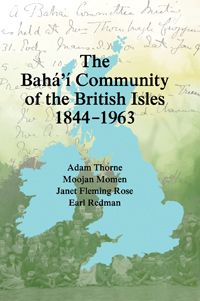The book begins with the earliest news about the new religion which reached the British government through diplomatic and consular channels and the British public through newspaper articles as early as 1845. During the late 19th century, there was a rising tide of awareness of the Bábí and Bahá’í religions in Britain.
Although one or two Bahá’ís were in Britain from 1885 onwards, a British Bahá’í community did not form until two residents of London joined in 1888–9 the first party of western Bahá’ís to visit ‘Abdu’l-Bahá in the Holy Land. ‘Abdu’l-Bahá made two visits to Britain and received widespread newspaper coverage. Prompted by British Bahá’ís, the British government made efforts to save ‘Abdu’l-Bahá during World War I and recognized the value of his work in the Holy Land, knighting him after the war.
`Abdu’l-Bahá chose Britain for the further education of his grandson, Shoghi Effendi, who was his successor. In 1957 Shoghi Effendi passed away in London and is buried there. The British Bahá’í community was chosen to host the first Bahá’í World Congress, held in London in 1963. During this Congress, some of the earliest meetings of the Universal House of Justice took place in London, which are the only occasions on which the Universal House of Justice has met outside the Holy Land.
In the years between the early accounts of the Bahá’í religion and the events of 1963 there developed a small but vibrant community across England, Wales, Scotland and Ireland. This book tells the fascinating, and little known, story of the lives of many of these early followers, how they came to hear of the religion, their efforts to spread it to others, the struggles they faced, the goals they strove to achieve, their efforts in Africa and around the world to share their religion with others, their steadfastness and their victories.





